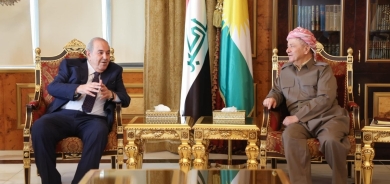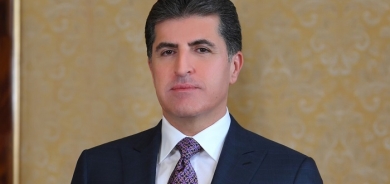David L. Phillips: Iraq will disintegrate. Then Iraqi Kurdistan will realize its national aspirations.
April 15, 2014
Exclusive Interviews

Gulan: Your Excellency was one of the diplomats and academicians that had a research about “Power Sharing” before the fall of former regime in Iraq, in which you had mentioned that the only way for Iraq to remain is through limiting the authorities of the Central Government and widening range of authorities of local regions. Iraq is currently, somehow, contrary to what you have stated. What is your opinion about Iraq now?
Phillips: Prime Minister Nuri al-Maliki has serious and objectionable authoritarian tendencies. He often behaves like Saddam Hussein by arbitrarily imposing his will on Iraqis, abusing their hard-fought democratic and community rights. In the name of fighting of terrorism, he has undermined the constitution and, in the process, destroyed the vision of Iraq as a democratic federal republic with power-sharing between its regions. It is time for a regime change in Iraq, but this time through the ballot box.
Gulan: Apparently, it has been for two years that President Barzani has announced that if Iraq heads toward dictatorship rule, Kurds will not follow dictatorship again and will declare independency. As Maliki has become all power of Iraqi state, do you think the world is supporting Maliki’s dictatorship rule or the world will be preserving a federal and democratic region like Kurdistan region?
Phillips: Iraq is a failed state. President Barzani does not need to declare independence of Iraqi Kurdistan. Iraq will disintegrate. Then Iraqi Kurdistan will realize its national aspirations.
The second part of your question is about dictatorship. Of course no one wants dictatorship in Iraq. But no external power is prepared to prevent it. Washington would prefer that Iraqis sort it out amongst themselves.
Gulan: You are aware about core of Iraqi constitution, which was drafted in 2005. According to that constitution the regions can run their own oil field affairs, and the oil and gas revenue belongs to all Iraqi people. But Maliki’s government doesn’t want Kurdistan region to exercise this right as a region. Don’t you agree that preventing from defined rights means Kurdish people are facing another dictatorship again?
Phillips: The Kurdistan Regional Government does not need approval from Baghdad to develop new oil and gas fields, a right that is constitutionally entitled. If Baghdad objects, the KRG should simply ignore the objections and continue on a course that serves the interests of its constituents. The rule of law matters.
Gulan: Maliki is apparently saying that he is not giving importance to independency of Kurdistan region and he claims for separation of Kurds from Baghdad. In your opinion, do you think that Maliki is willing to peacefully resolve the separation issue through dialogue or it seems to be another tactic for their surviving in the current crisis?
Phillips: Maliki wants to blame the Kurds for creating problems in Iraq. In fact, Maliki is responsible for Iraq’s current crisis. He has taken a confrontational approach, while abusing the rights of Kurds. Maliki bears responsibility for Iraq’s troubles.
Gulan: In case Baghdad wants to have Kurdistan region separate from Iraq, and Kurdistan region considers it as a positive solution, how will international politics be welcoming the agreement between Erbil and Baghdad for dividing Iraq?
Phillips: The Helsinki Final Act of 1975, which established the Commission on Security and Cooperation in Europe, established international principles regarding sovereignty and partition. Sovereignty is enshrined in the covenant. But the treaty also establishes that states can choose to partition based on mutual agreement and through an orderly process. The separation of Slovakia and the Czech Republic is a good example.
Of course, Iraqi Kurdistan’s independence will require cooperation from its neighbors. Turkey has the most to gain from an independent, sovereign, and stable Iraqi Kurdistan. To advance its national interests, Turkey should steward the independence of Iraqi Kurdistan. It should also guarantee its security. This scenario can happen after Turkey finishes its national elections and makes progress providing genuine political and cultural rights to Kurds in Turkey.
Gulan: What is surprising is that the American politics does not have the ability to resolve Iraqi crisis through dialogue and does not let the ground to be suitable for dividing Iraq. In your opinion, what kind of Iraq does the USA want to see? A disintegrated Iraq that is too risky for the whole region?
Phillips: The Obama administration wants Iraqis to resolve their differences through political dialogue. President Obama has his hands full in Afghanistan, Syria, as well as with Russia’s aggression against Ukraine. Iraq is not a priority for the United States. Washington gave up its leverage when it walked away from the Status of Forces Agreement. Instead of selling weapons to Baghdad, the U.S. should provide assistance to the Kurds who, I’ve long maintained, are America’s best and only friend in Iraq.
Gulan: If we take a look at the current situation in Iraq, we see that despite the ruling party’s oppressing the competitors, there is a severe ongoing sectarian violence. In your view, to what extent, in internal political crisis, can elections produce democracy?
Phillips: Elections are supposed to be a tool for conflict resolution, giving voice to people and distributing power between groups. However, democracy is not just about elections. It requires institutions that are accountable and an active civil society demanding transparency of its leaders. Iraq lacks democratic institutions and it suffers from a weak civil society. Moreover, Iraq’s current leadership has betrayed the Iraqi people. It is a deep disappointment to Americans who saw the United States sacrifice so much for Iraq’s freedom.
Gulan: How do you interpret the situation in Iraq as it is heading towards elections and what is your prediction for elections? How can Kurds continue with Iraq if Maliki gets re-elected? What is your message to our people and your recommendations?
Phillips: I don’t predict elections. I can say, however, that Iraq was never a legitimate State. Iraq is a colonial construction that was always illegitimate. The problem with Iraq has always been the over-centralization of power. The 2005 constitution was designed as a remedy, by institutionalizing power-sharing arrangements. But Maliki’s Iraq will not survive. It is doomed to disintegrate, launching a new phase in the struggle of Iraqi’s for rights and self-determination. Iraqis should agree on a process for managing the country’s transition political dialogue.















